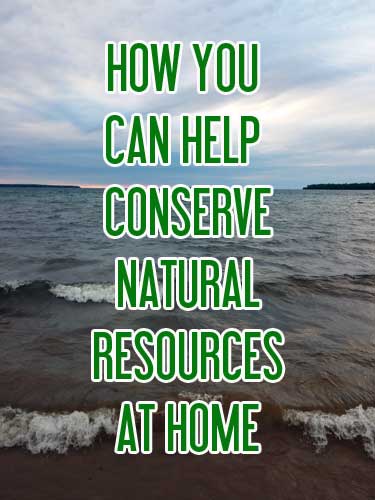How You can Help Conserve Natural Resources at Home
 Earth Day was this week, and folks in Michigan had a lot to celebrate and be thankful for.
Earth Day was this week, and folks in Michigan had a lot to celebrate and be thankful for.
We’re rich in natural resources here. A portion of four of five Great Lakes lie within our borders. 35,000 inland lakes and 49,000 miles of river stretch across our state. Wetlands, sand dunes and forest make up the rest out landscape. These all provide habitats for wildlife.
Those of us living in Michigan benefit from all its natural resources. 84 percent of North America’s fresh water is in the Great Lakes. 26 million people in the region get their drinking water from the lakes. Those resources also draw tourists, helping to provide thousands of jobs and billions of dollars to our economy. We also live in and among those resources, taking in the beautiful scenery, swimming in the waters and walking the trails every day.
It’s important to protect and be good stewards of all these natural resources we’re blessed with. It might seem like what do as individuals doesn’t matter, but ma people doing small things can have a big result.
Here’s a list of some simple things we can all do at home to ensure Michigan’s outdoors are something everyone can continue to enjoy and benefit from.
1. Instead of bagging and tossing grass clippings and leaves, use them to make compost. Compost can be added to soil for potted plants or spread in flowerbeds and gardens.
2. Plant a tree. Besides cleaning carbon monoxide from the air, trees strategically planted around your home provide cooling shade in summer and shelter from cold winds in the winter which reduces your energy costs and carbon footprint.
3. Reduce the amount of city or well water you use by collecting rainwater. Use the collected water on your outdoor plants and garden.
4. Bird feeders and baths will attract birds your yard and garden. They provide natural pest and weed control and also help with plant pollination.
5. When using fertilizers and pesticides, measure the area you plan to treat and use only the exact amount you need for that space according to the product’s instructions. This prevents overuse that results in runoff getting into storm drains and fresh water.
6. When not using pesticides and fertilizers, store them up off the ground in leak proof containers to prevent spills.
7. Only use phosphorus free fertilizer. Phosphorus gets into fresh water, reduces the amount of oxygen in the water and harms aquatic plants and animals. Home use of phosphorus-based fertilizer in actually illegal in Michigan.
8. When cutting your grass, keep it at least 3 inches high. Taller grass crowds out weeds and promotes deeper roots, making it more drought resistant and reducing the need to water.
9. In the spring and fall, aerate your lawn by poking holes three inches deep, six inches apart through out. This allows your lawn to “breathe,”and it also helps water flow down to the roots of the grass.
10. Use mulch in your flower beds to help hold in moisture and reduce the need to water.
11. Watering lawns, plants and gardens either in the morning or evening prevents evaporation and makes your watering more effective.
12. In the home, replace any leaky fixtures and shorten your time in the shower to conserve water.
13. Use green cleaning products whenever you can. The chemicals in other products can make their way into fresh water supplies. Green products are becoming more and more available and affordable at local grocery and big box stores.



